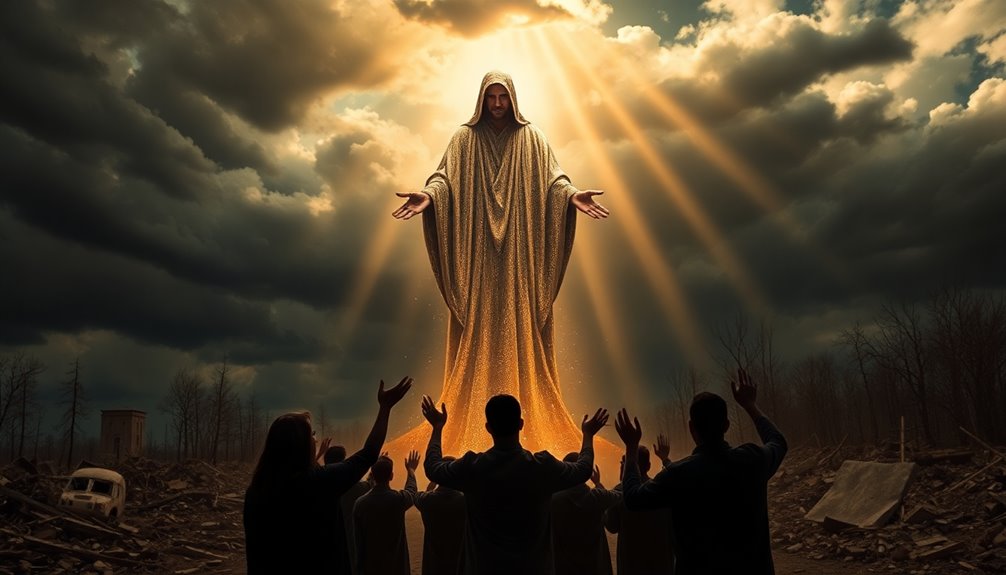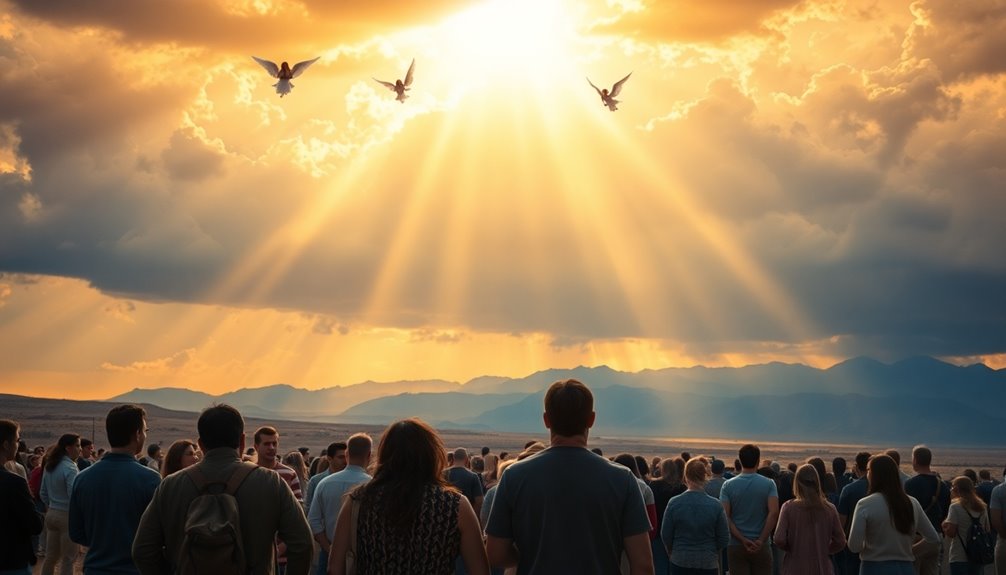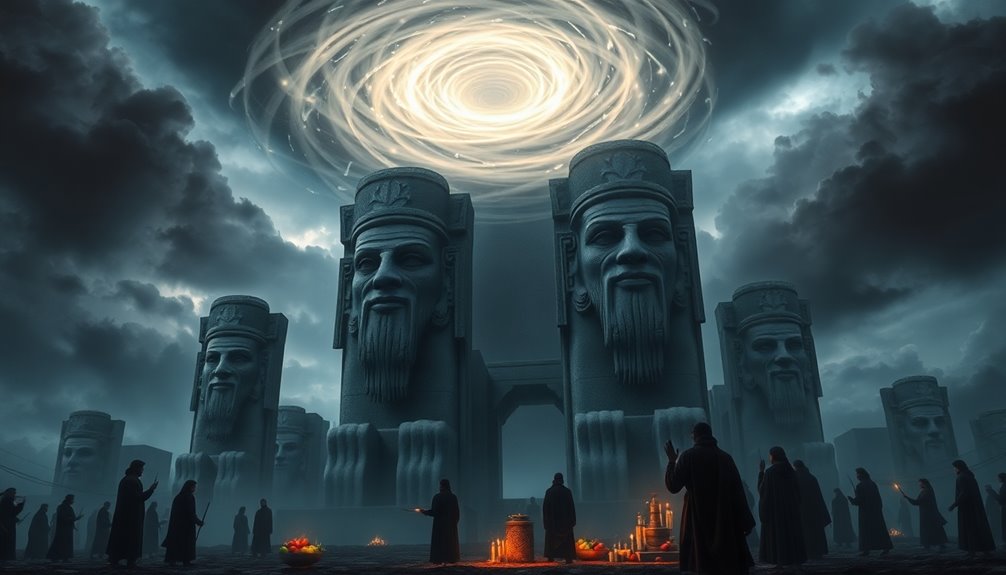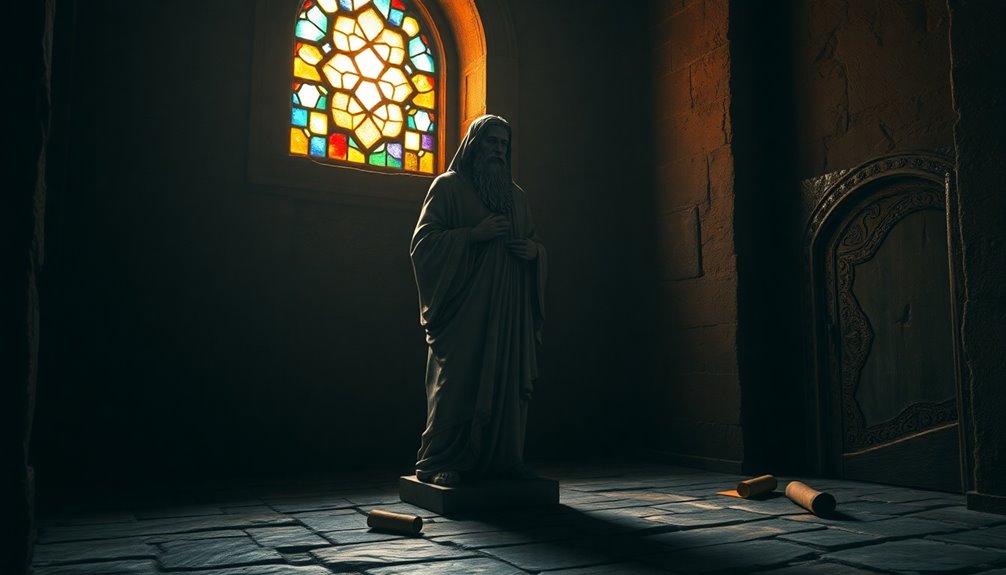On Judgment Day, you'll confront the ultimate evaluation of your life. Every soul will be resurrected and judged by Jesus Christ. Righteous individuals, whose names are in the Book of Life, will enjoy eternal life in heaven. Conversely, those deemed unrighteous will face separation from God and eternity in punishment. It's a time of reckoning for your actions and words. Misconceptions about this day abound, but understanding its significance is crucial. By examining personal accountability and divine justice, you'll discover what truly lies ahead on this monumental day.
Key Takeaways
- Judgment Day involves the resurrection of all souls for evaluation before Jesus Christ, determining their eternal fate.
- Righteous individuals will have their names inscribed in the Book of Life, granting them eternal life in heaven.
- The unrighteous will face separation from God and eternal punishment, based on their deeds and faith in Jesus.
- Each person will be held accountable for their actions, words, and choices made during their lifetime.
- The timing of Judgment Day is known only to God, and is distinct from immediate post-death judgment.
Introduction

Judgment Day stands as a pivotal moment in Christian belief, where the fate of every individual hangs in the balance. This event, often referred to as the Final Judgment, marks the second coming of Jesus Christ.
On this day, you'll find that all souls are resurrected, and everyone gathers before Jesus for a thorough evaluation of their lives. It's a profound moment that emphasizes accountability, as your actions, thoughts, and faith will be scrutinized.
The outcomes of this divine judgment are clear: those deemed righteous will have their names written in the Book of Life, granting them eternal life in heaven. Conversely, those found wanting will face separation from God and eternal punishment.
Key biblical passages, such as Matthew 25:31-46 and Revelation 20:11-15, provide insights into the criteria for judgment, reinforcing the importance of living a life aligned with Christian teachings.
While the exact timing of Judgment Day remains unknown, as highlighted in Mark 13:32, it serves as a reminder for you to live in faith and preparedness.
Ultimately, the choices you make today will shape your eternal destiny on that momentous day.
Scriptural Insights on Judgment Day

When you think about Judgment Day, it's essential to consider what scripture says about it.
Key passages like Acts 17:31 and Revelation 20 provide powerful insights into how God will judge the world and determine each person's eternal fate.
As we explore these biblical references, you'll gain a clearer understanding of what to expect on that significant day.
Primary Bible References
The great white throne judgment is a powerful image found in the Book of Revelation, illustrating the moment when all the dead will stand before God to be judged for their deeds.
On Judgment Day, those not found in the Book of Life will face eternal punishment, a stark reminder of the consequences of their choices. Matthew 25:31-46 reinforces this by depicting the separation of the righteous and the wicked, where Jesus rewards the faithful with eternal life while condemning the unfaithful to everlasting punishment.
Additionally, 2 Corinthians 5:10 states that you must appear before the judgment seat of Christ to receive recompense for your actions, whether good or bad. This emphasizes personal accountability.
Acts 17:31 underscores that God has appointed a day for judging the world in righteousness through Jesus Christ, affirming the inevitability of this divine assessment.
Lastly, Matthew 12:36-37 highlights that you'll be held accountable for every careless word spoken, indicating the comprehensive nature of God's judgment based on your thoughts, words, and actions.
This collection of scriptures paints a vivid picture of the profound reality awaiting each individual on Judgment Day.
Secondary Bible References
In addition to the primary biblical references, secondary scriptures provide further insights into the nature and implications of Judgment Day. For instance, 2 Corinthians 5:10 emphasizes that you'll appear before the judgment seat of Christ, receiving what's due for your actions, whether good or bad. This highlights the importance of your choices in life.
Revelation 20:11-15 vividly describes the Last Judgment, where the dead are judged according to their deeds recorded in the books. The Book of Life plays a crucial role in determining your eternal destiny.
Matthew 12:36-37 underscores that every idle word you speak matters, as you'll give an account for them during judgment. Acts 17:31 states that God has appointed a day for judging the world through Jesus Christ, making faith in Him central to your judgment outcome.
Furthermore, Matthew 25:32 illustrates the separation of the righteous from the wicked, akin to the sheep from the goats. The righteous will inherit the kingdom, while the wicked face eternal punishment.
These scriptures collectively shape a profound understanding of what awaits you on Judgment Day.
Judgment Day in Ancient Cultures

Ancient cultures had fascinating ways of envisioning Judgment Day, each with unique beliefs about what happens after death.
In ancient Egypt, the judgment of the dead was overseen by Osiris, where your heart was weighed against the feather of Ma'at. This determined your fate in the afterlife, allowing you either an eternal resting place in paradise or a fate worse than death.
The ancient Greeks had their own system, ruled by Hades. Here, souls were judged by three judges—Minos, Rhadamanthus, and Aeacus—who decided your eternal resting spot in the Elysian Fields, Asphodel Meadows, or Tartarus based on your deeds.
Zoroastrianism introduced the concept of the Chinvat Bridge, where you'd cross into the afterlife. The righteous passed easily, while the wicked fell into the abyss.
In Norse mythology, the dead were judged in Helheim. Dishonorably fallen souls ended up with the goddess Hel, whereas warriors who died bravely were welcomed into Valhalla.
Ancient Hindu texts speak of Yama, the god of death, who assesses your karma to determine your reincarnation. Each culture paints a vivid picture of the judgment by God and the judgment of the dead.
Cultural Perspectives on Judgment

Different cultures and religions shape distinct views on Judgment Day, reflecting their unique beliefs about life, death, and morality.
In Christianity, the final judgment will occur at the great white throne, where individuals are held accountable based on their faith in Jesus and their deeds.
Islam presents Yawm al-qiyāmah, a day of resurrection where everyone is judged according to their works, emphasizing personal accountability.
Judaism offers a variety of interpretations, with some viewing Rosh HaShanah as a significant day of judgment, while others believe judgment takes place at death or during a future resurrection.
Zoroastrianism introduces the concept of Frashokereti, focusing on the ultimate victory of good over evil through individual responsibility for thoughts, words, and deeds.
In Eastern Orthodox Christianity, there's a dual aspect of judgment, where a particular judgment occurs at death and a general judgment follows the Second Coming.
This highlights the interplay between divine grace and moral behavior. As nations shall be gathered for this momentous occasion, these diverse perspectives illustrate humanity's complex understanding of justice and the search for an eternal reward.
Judgment Day's Timing Confusion

You might find the timing of Judgment Day a bit perplexing, especially with so many interpretations and predictions swirling around.
Many have felt disillusioned after following false prophecies, raising doubts about divine justice and what it truly means for believers.
Understanding these misconceptions can help you navigate the urgency of signs without losing sight of the call to live faithfully every day.
Debunk Common Misconceptions
Judgment Day often sparks intense speculation about when it will occur, but many of these beliefs are rooted in misconceptions. You might think you can predict the timing of Judgment Day, but according to Mark 13:32, only God knows when this event will take place.
It's also a common error to believe that Judgment Day happens immediately after death; in reality, it's a separate event occurring at the end of times.
You may notice signs like wars and natural disasters and think they signal imminent judgment, yet these signs have been present throughout history and don't indicate a specific timeline.
Another misconception is that your personal righteousness can influence when Judgment Day occurs. The Bible emphasizes God's sovereignty over this timing, not our deeds.
Finally, some believe that living a good life exempts them from judgment. However, Scripture teaches that everyone will be judged according to their faith in Jesus Christ and their actions, regardless of personal perceptions of righteousness.
Understanding these misconceptions helps clarify the true nature of Judgment Day and prepares you for what lies ahead.
Doubt About Divine Justice
Many believers grapple with doubts about divine justice, especially when facing the uncertainty of Judgment Day's timing. The Bible makes it clear that only God knows when this day will come (Mark 13:32). This lack of clarity often leads to confusion and skepticism. You might wonder why God allows injustices and suffering to persist while waiting to execute judgment. Skeptics point to the apparent prosperity of the wicked as evidence that God's justice is delayed or even nonexistent.
Additionally, the New Testament warns that scoffers will question the promise of Christ's return and the impending judgment (2 Peter 3:3-4). They challenge your faith by highlighting the presence of evil in the world. Yet, it's essential to remember that this delay serves a purpose. God's patience offers everyone an opportunity for repentance, as emphasized in 2 Peter 3:9.
Despite the doubts surrounding divine justice, stay vigilant and steadfast in your faith. Your behavior on earth matters, and trust that God's justice will ultimately prevail, leading to the second death for those who reject Him.
Embrace this time as a chance to grow and reflect.
Self-Reflection on Personal Actions

As you think about Judgment Day, consider how your actions reflect your values and beliefs.
It's essential to take personal accountability for your choices, but you don't have to do it alone—your community can help support your journey toward growth.
Together, you can encourage one another to stay aligned with biblical teachings and maintain a mindful approach to your words and deeds.
Individual Moral Accountability
On Judgment Day, you'll confront the reality of your individual moral accountability, facing the consequences of your actions, thoughts, and words.
You'll stand before the judgment seat of Christ, where every deed—good or bad—will be scrutinized. This emphasizes the importance of moral integrity, as Matthew 12:36-37 reminds us that our words carry weight. You won't be judged on personal opinions but on God's word, which sets the standard for your life.
Your acceptance of salvation through Jesus Christ will also be pivotal during this evaluation. Acts 10:42 emphasizes adherence to biblical teachings and commands, making it crucial to align your life with these principles.
As you reflect on your journey, consider the moments where genuine repentance could have led to spiritual growth. 1 John 1:9 encourages this self-reflection, allowing you to learn from your mistakes.
On Judgment Day, the culmination of your choices will reveal the path you've walked. Embrace this opportunity to assess your actions and strive for a life that reflects your faith, ensuring you're prepared to meet the consequences of your individual moral accountability.
Congregational Support for Accountability
Congregational support plays a vital role in fostering accountability, allowing individuals to engage in meaningful self-reflection on their actions. When you participate in church activities like study groups and prayer meetings, you cultivate an environment of transparency and honesty. These communal discussions encourage you to examine your personal actions in light of scriptural teachings.
Many congregations stress the importance of confessing sins and seeking forgiveness, making it clear that acknowledging wrongdoing is essential for spiritual growth. By sharing your struggles and successes with others, you reinforce your commitment to accountability.
Mentorship programs within the congregation can be particularly beneficial, as mature believers guide you in evaluating your life choices according to biblical principles.
Furthermore, congregational teachings often remind you of the reality of Judgment Day, motivating you to live righteously. This collective focus on accountability helps you reflect on your actions and their alignment with your faith.
Ultimately, the supportive nature of your congregation encourages not only personal accountability but also fosters a deeper connection with God and your community, paving the way for meaningful spiritual growth.
Final Thoughts on Divine Justice

Divine justice stands as a cornerstone of faith, offering a profound sense of accountability for our choices. Judgment Day represents the ultimate expression of this justice, where God evaluates the actions and faith of every individual. It's a day when the righteous and wicked are separated, reflecting the impartial nature of divine judgment.
You can find comfort in knowing that God's love is intertwined with this justice, as believers are promised eternal life through faith in Jesus Christ.
The criteria for divine judgment hinge on adherence to God's commandments, emphasizing the importance of living a life aligned with His teachings. Scripture assures you that no favoritism exists; everyone's actions will be weighed equally, regardless of status or background.
Those who accept God's salvation will rejoice in eternal life, while those who reject it face everlasting punishment, a sobering reminder of the consequences of our choices.
Ultimately, Judgment Day encapsulates God's redemptive plan for humanity, where mercy and justice coexist. It's a call to live responsibly, fostering a genuine relationship with God, and embracing the hope that comes from faith and repentance.
You have the power to choose your path, and that choice shapes your eternal destiny.
Additional Resources

To deepen your understanding of Judgment Day and its significance, several resources can enhance your study and reflection. Start by exploring the Book of Revelation, which outlines the events of Judgment Day, including the resurrection of the dead and the separation of the righteous from the wicked. This biblical account provides a vivid depiction of the Day of Judgment and how Jesus will judge each individual based on their actions and acceptance of salvation.
You might also consider studying the signs preceding Judgment Day, as highlighted in Matthew 24. Understanding these signs, such as wars and natural disasters, can help you recognize the urgency of preparation. It's crucial to reflect on the promise of eternal life for believers, contrasted with the eternal separation from God that awaits non-believers.
Additionally, delve into resources that discuss God's justice and the importance of living a life reflective of Christian values. Engaging with these materials encourages confession of sins and good deeds, ensuring you're spiritually prepared for this monumental day.
Frequently Asked Questions
What Will Happen During Judgment Day?
During judgment day, you'll stand before Jesus Christ, alongside everyone else, to face a final assessment of your life.
Your actions, thoughts, and acceptance of Him as your Savior will be weighed. This moment isn't about personal opinions; it's a just evaluation based on God's word.
Depending on the outcome, you'll either receive eternal life in heaven or face consequences.
It's an essential moment that defines your eternal destiny.
What Will God Say on Judgement Day?
On Judgment Day, God'll likely ask you about your relationship with Jesus.
He may want to know how you lived out your faith and whether you served others with love. Your hidden motives will come to light, revealing the sincerity of your heart.
He'll evaluate how you used your gifts and talents for His glory.
Ultimately, His questions will reflect His holiness and justice, guiding your eternal outcome based on your choices.
What Will Happen to Humans on the Day of Judgement?
On the day of judgment, you'll face an evaluation of your life.
Every action, thought, and word will be scrutinized, revealing your true motives.
You'll stand before Jesus, and your acceptance of Him as Savior will be crucial.
If you've lived a life aligned with His teachings, you'll receive eternal life and joy.
However, if you've rejected Him, you'll confront separation from God and the consequences that follow.
The choice is yours.
Will You Be Alone on Judgement Day?
Yes, you'll be alone on Judgment Day.
It's a personal assessment where you stand before Jesus, and no one else can speak for you. Your faith and actions throughout your life will be scrutinized, and you can't lean on your church or community for support.
This moment emphasizes your individual responsibility, so it's crucial to reflect on your beliefs and choices now, as they'll shape your eternal fate.










